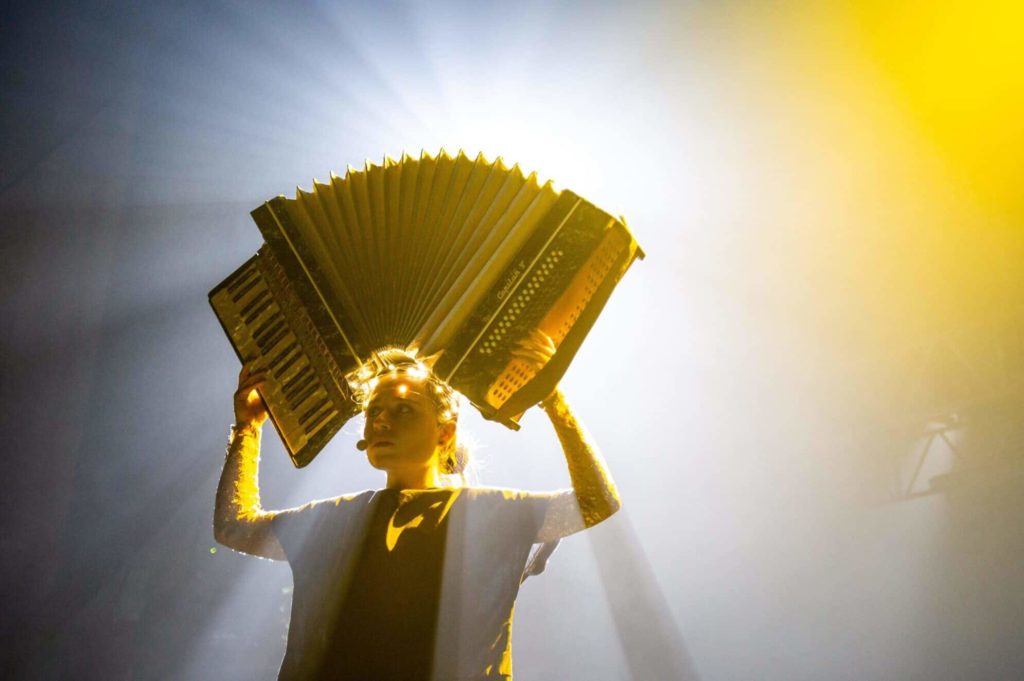
HUDDERSFIELD Contemporary Music Festival sprang back into full ten-day mode for the first time since Covid with this shattering “archaeological opera” from Ukraine.
That country had been pencilled in for a major strand in the 2022 festival, as part of the Future Reimagined UK/Ukraine Season of Culture, long before the outbreak of hostilities there. So this UK premiere of Chornobyldorf could hardly have been more poignantly timed.
A co-composition by Roman Grygoriv and Illia Razumeiko, it was premiered in October 2020 by Opera Aperta at Mystetskyi Arsenal, Ukraine’s flagship arts complex in Kyiv. Opera Aperta is a “contemporary opera laboratory” that works in partnership with Ukraine’s own proto produkciia and Musiktheatertage Wien.
The work’s libretto was compiled by the composers from four sources: Ivan Kotlyarevsky (1769-1838), the pioneer of modern Ukrainian literature; poet and novelist Yuriy Izdryk (who has a role in its videos); Ovid’s Metamorphoses and composer Razumeiko himself.
The composers also acted as their own set designers and cast themselves as Greek characters, plucking microtonal dulcimer and bandura, while directing the whole show.
The accidental disaster at the Chornobyl nuclear power plant in April 1986, when the core of one of its reactors melted, caused widespread soul-searching, not least in Ukraine itself. The recent Russian invasion has redoubled the anguish and underlined the wider existential threat.
Seven video-novels shown on two vast screens were shot in areas around Chornobyl as well as Zaporizhzhia, Europe’s largest nuclear plant (now shut down), and in abandoned churches, theatres and galleries, such as have become sadly apparent on every television worldwide.
Denuded forests, shapeless lakes and piles of rubble were sparsely populated by naked humans, often in foetal positions. Indeed, many of the cast appeared unclothed at various times, humankind stripped of protection or dignity. For the work is a post-apocalyptic fantasy that tries to discover “a world after the death of capitalism, opera and philosophy”.
The performance area in this spinning mill was broadly cruciform, with the audience within its arms, uncomfortably ‘inside’ the action. At one end of a central catwalk stood a scaffolding tower with what amounted to an altar beneath; at the opposite end was an apron stage.
Four instrumentalists lined the walls, one of them commanding a huge array of mainly home-designed percussion attributed to Evhen Bal. The screens behind were like scoreboards on a cricket ground, always there for reference for anyone losing their bearings.
The broad thematic canvas opened up a number of potential potholes, not least lack of focus. With texts in Ukrainian and Latin –and no surtitles – this seemed bound to happen. Oddly enough, it didn’t.
All seven ‘novels’, although self-contained, were clearly linked. The musical mood was largely sombre, forming a vast requiem for civilisation. Over an unbroken span of over two hours, this might have been tedious. That it was not owed everything to the commitment and energy running through the veins of every last one of the cast.
Electronic sounds and live instruments blended well and permeated everything. But what really hit home was the amplified thesaurus of human noises – chant, folk-song, choral speaking, recitative, operatic techniques, rock screams, even rap – all of which, in conjunction with the vivid, often national-style costumes (Katerina Markush) spoke of a distinctive local culture, proudly delivered, alongside a universal one.
Khrystyna Slobodianiuk, the choreographer for the whole show, played the title role in ‘Elektra’. Sophocles came to mind, so long as the Greek chorus lasted. But with a chanted duet from two circling dancers, it broke up, the first element of civilisation to dissolve.
‘Dramma per Musica’ brought us a wordless female trio, followed by a properly sung lament and a strong baritone in drag. But a Bach chorale struggled to survive within an ever-murkier soundtrack. Two excellent dancers in ‘Rhea’ became spasmodic, before yielding to a manic torch-dance, over rumbling, menacing percussion. This was dance in its death-throes.
Next under threat was music itself, as three ladies in ‘The Little Accordion Girl’ rattled the keys of their accordions before letting them flop open, allowing random squawks. Cymbals and metronomes were carried as offerings, against a Hebrew-style chant over a drone. The central accordion became a headdress.
With ‘Messe de Chornobyldorf’, we entered seriously religious territory. Two singers in national dress offered Orthodox chants, which speeded into disintegration when two vestal virgins, ever more frenzied like the drumming, dismantled the formal rite. A cello battled desperately to be heard above the tumult with the Agnus Dei from Bach’s Mass in B minor.
In ‘Orfeo ed Euridice’, the latter’s body was prepared for burial as a chorus slowly chanted, breaking up as the earlier baritone took over in a powerful lament. A nude Orfeo on the apron conducted jazzily decadent rhythms.
The concluding ‘Saturnalia’ was positively anarchic, with a minor-key version of something like ‘Frère Jacques’; it became increasingly operatic, accelerating as it was taken up by brass band.
After a brief appearance on video, Leonid Brezhnev was now spun upside down in effigy and trampled underfoot. Cue thunderous choral rejoicing that left everyone vibrating.
A mere catalogue of events does scant justice to the effect of this extraordinary work. Its potent weave of music and theatre, liberally laced with irony, had a riveting spontaneity. Rarely can so much determination, and presumably anger, have been channelled so devastatingly into a work of art.
We must applaud the festival’s initiative in scheduling the event, with sterling support from the British Council. It was due to enjoy a performance at Battersea Power Station. Not enough, not nearly enough. Everyone should have the chance to experience it. We are all Ukrainians now.
Review by Martin Dreyer
Huddersfield Contemporary Music Festival continues until November 27: hcmf.co.uk
